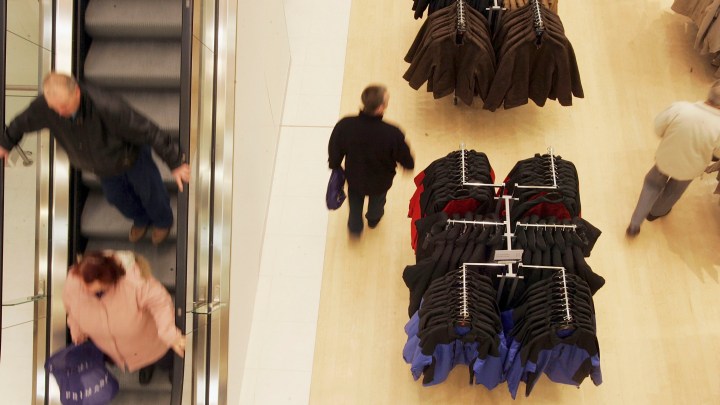
How we shop for clothes now

It was Memorial Day weekend, and Krysti Carlson-Goering needed new clothes. She works in IT at Wichita State University in Kansas, and the office was about to reopen. So she went to the store, grabbed a pair of pants and headed to the dressing room.
“I intentionally picked a size up that I normally thought I wore, and even it was too tight,” she said. “And it was a little depressing at first.”
Like a lot of people, Carlson-Goering gained weight during the pandemic — and being in that dressing room brought up some feelings.
“It’s just, whatever the peer pressure is that you have to be a certain size, you know, to really be accepted,” she said.
Then she went to another store, where a sales associate just brought her stuff and made a point of telling her: Don’t look at the label.
“It was like, ‘Oh well, try these on. Yeah, they may be this size, but we’ve been told they fit a little loose, you know, or they fit a little tight,’” Carlson-Goering said.
“And so I tried on a vast array of sizes, and I didn’t feel bad,” she said. “And I think it was because that associate at that store made me feel like it didn’t matter what the size was, it was what looked good. And what felt good.”
What felt good, it turns out, was different from before. First of all, it was comfortable. She had become used to wearing leggings and loose-fitting shirts while working from home.
“I just felt better, and I just was more relaxed. I didn’t feel as stressed,” she said. “I guess you don’t realize how wearing tight clothes, like how uncomfortable that really is.”
Clothing sales have gone up recently. But that’s not the whole picture. The kind of clothing many people want to buy and wear has changed because of the pandemic.
In that moment at the store, Carlson-Goering decided to disregard the judgmental thoughts that kept popping into her head about her size or whether that shiny, gold blouse or those Converse shoes were age-appropriate.
“Because yes, I may be 56 years old, but, you know, I can dress this way if I want to,” she said. “It’s comfortable, and I just don’t care what everybody else thinks.”
The pandemic has been a wake-up call, a reminder that “life is really precious,” she said. “Do what you want to do, wear what you want to wear, be comfortable in who you are.”
The long stretches of isolation over the past year have given a lot of people the time to figure that out and to explore.
Rahil Rojiani recalls a moment from last year: “I remember going to some very open patio space last summer for my birthday and wearing this black-and-white longer skirt for the first time that I’d had for, like, two years but hadn’t really worn yet.”
Rojiani is genderfluid and for a long time had mostly worn clothes that are generally seen as masculine, like button-downs and slacks.
But during the pandemic, they had time to think about what they wanted to wear, what felt right.
So that day on the patio, at first, Rojiani worried about being judged.
“It took the process of being out in public with it to be, like, to have this really magical moment after I was letting go of some of the layers of unease to be like, ‘Oh my God, this feels so freeing. I could do this all the time. What would it be like to be free?’”
That question feels more urgent now.
Rojiani is a resident at a public hospital in Cambridge, Massachusetts.
“I think COVID, and particularly for me, being on the front lines, really brought into focus our collective, you know, this is kind of it, how do we want to live?” they said.
For Rojiani, in the context of clothing, that means figuring out a new style. Since that day on the patio, they’ve gone thrift shopping and got a few outfits from their partner, like a mustard-yellow jumpsuit and an ankle-length maroon skirt, both of which are loose-fitting and flowy.
Because the other thing Rojiani realized after the past year is they want to be comfortable.
There’s a lot happening in the world. Through it all, Marketplace is here for you.
You rely on Marketplace to break down the world’s events and tell you how it affects you in a fact-based, approachable way. We rely on your financial support to keep making that possible.
Your donation today powers the independent journalism that you rely on. For just $5/month, you can help sustain Marketplace so we can keep reporting on the things that matter to you.












